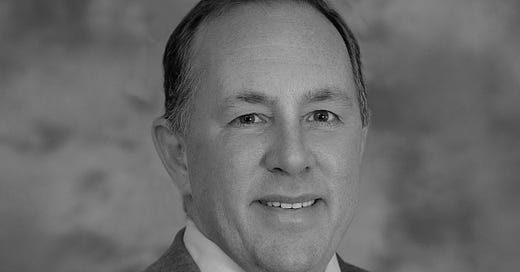Rapid Acting Mental Health Treatment SF 2025!
Featuring The Carlat Report and UnitedHealth Group Leaders In The Same Room!?! Coming January 12th!
The Frontier Psychiatrists started having live-action newsletter events last year. We called them rapid-acting mental health treatment, or “RAMHT” for short. This year, we have discussants, to whom I will now introduce you.
The concept for this series of events was requests from my readership. Grady Hannah, who helped build the event with me, said there was something special going on in the digital pages of this newsletter that needed to be brought to life. The finance industry needed to understand that rapid-acting mental health treatment exists. Patients need to realize that rapid-acting mental health treatments exist. Payers need to know that these treatments can change the landscape of reimbursement and risk management. And clinicians need to know there's hope here, now, for their patients. More hope is coming, too. Today's article is about two of those discussants.
The first formerly held a leadership role in one of the favorite corporate topics for this newsletter —UnitedHealth Group. I know what you're thinking, readers: why is Owen hanging out with executives from United Healthcare? I thought Owen was anti-United Health Group… of course not. We kid because we love…or at least “recognize the importance, scale, and market dominance of,” which rounds up to “love” in American healthcare.
Eric Vanderhoef
I'm pro, whatever is good for patients! I am fascinated by the dynamics that enable individuals to work in these organizations. Many who do that kind of work (or used to) have ended up in my world. Some of those individuals have become friends. One of those friends? He was in senior leadership at United. Introducing Eric Vanderhoef. I asked him for a bio, and he was gracious enough to oblige.
Eric is a healthcare executive with extensive experience working with HMOs, including serving as CEO of United Healthcare’s most profitable Medicare Advantage plan. He has successfully led contracting departments for Aetna and Kaiser Permanente. Currently he consults with providers and investors seeking to navigate and collaborate with HMOs.
If we want to change the landscape around mental health treatment, it's crucially important to understand the internal worlds of the organizations that can choose to pay for those treatments or not. I know large organizations are made up of people working together to achieve their own goals while under the financial pressures of the market. This regularly forces decisions we would all hope would be otherwise. So we need to hear from experts like Eric and ask him the questions we're all wondering about. As someone who is no longer inside the belly of the beast, he's slightly more free to speak freely.
I also like him— quite a bit— because he's funny, smart, and cares about the better world we are all working towards.
Chris Aiken, M.D.
My other guest is the editor and chief of the Carlat Report, a newsletter to which one out of five Psychiatrists subscribe. He is a great writer and a thoughtful physician, and he has excellent taste in poetry, it turns out. He's not a dangerous radical, like your author, but he's one of the least biased voices in the field of psychiatry. His leadership at Carlat Report has led to a podcast and fantastic educational content, and he is deeply connected to what ordinary psychiatrists have to deal with on a day-to-day basis.
About The Carlat Report
The Carlat Report is a monthly CME newsletter and weekly podcast for practicing psychiatrists. Approximately 1 in 5 US psychiatrists subscribe to a Carlat journal, including editions for general psychiatry, child psychiatry, addictions, and hospital psychiatry. It has operated free of industry support since 2003.
Chris is the editor-in-chief of the Carlat Psychiatry Report and an assistant professor of psychiatry at New York University and Wake Forest Schools of Medicine. He is the director of Psych Partners, a collaborative care practice in the Southeast. He has authored peer-reviewed papers and books and is currently finishing a textbook on Difficult to Treat Depression.
I am over the moon to have Chris joining the conversation.
These discussions will join Grady Hannah, Carlene MacMillan, MDhub.ai, Sanmai, Videra Health, GrayMatters Health, Fermata, Acacia Clinics, Nightware, and others that we hash out what the rapid activity future looks like. If we are lucky, the team from Radial might be skulking around, and I have it on good authority other movers and shakers like Fred Ma and Anthony Sterns from iRxReminder will be hanging out. Will we have others? What about Ampa Health? I don’t know—it’s the kind of night where anything could happen, as long as it’s in compliance with all appropriate rules and regulations.
Join us— get your tickets right here.






“Rapid acting mental health treatment” sounds enticing in it of itself! I look forward to your writings post event!